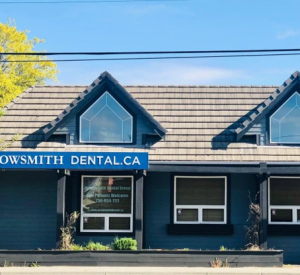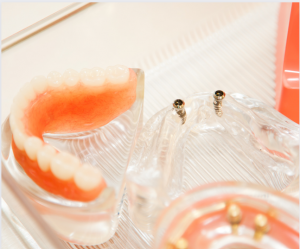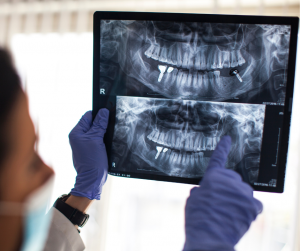Best Dental Implants 2022
Dental implants are an innovative method of replacing missing teeth. However, with so many options available, it can be difficult to know which one is best for you. That is why we created this guide to assist you to know everything you need to know on tooth implants and find best one to youself.
What Are Dental Implants
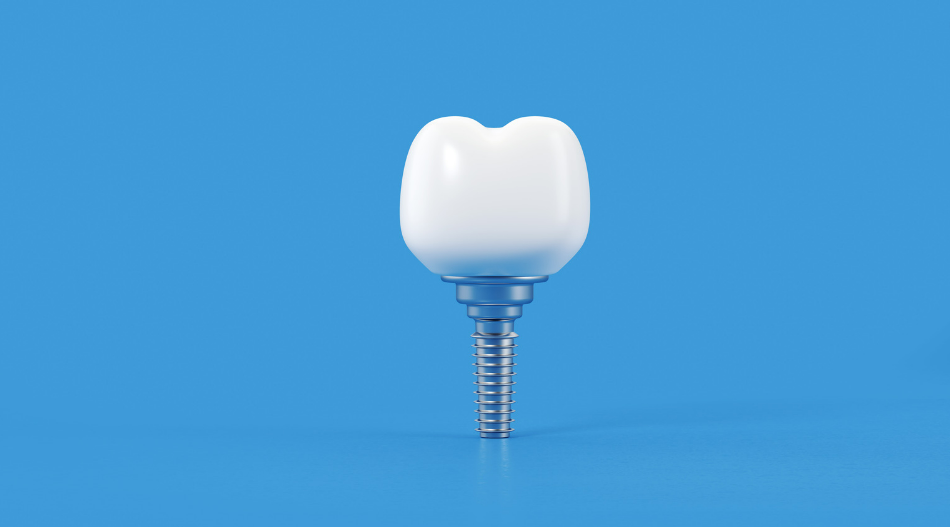
It’s no secret that losing your teeth can have an impact on your social life, the way you speak, and even your ability to eat. Because your smile is such an important part of who you are (because it reveals how confident you are in yourself), when something goes wrong with your teeth, your smile may fade, along with any happiness that comes with having healthy teeth and gums.
Dental implants can improve your smile and overall quality of life whether you have one or several missing teeth. Dental implants are exactly that: implants that attach to the jawbone and serve as a foundation for replacement teeth.
Dental implants are titanium posts surgically implanted into the jawbone. Once the post is in place, it will gradually fuse with your bone, forming a strong foundation for a new tooth.
Tooth implants can replace a single tooth or several teeth. Dentures can also be replaced with them.
The dental implant procedure begins with an evaluation and consultation with one of our specialists. We’ll evaluate your oral health during this appointment to see if dental implants are a good fit for you. If they aren’t, we’ll talk about other options like traditional dentures or partial dentures.
Your next step will be an X-ray and CT scan, during which we will take pictures from various angles to create a 3D model of your mouth and jawbone. This allows us to look for any abnormalities that could jeopardize treatment success, such as bone loss or gum disease (periodontal disease). It also allows us to see if there are any existing conditions, such as previous surgeries or broken teeth, that would make it difficult for us to place implants safely into these areas without causing further damage or pain during recovery time later down the road once everything has healed properly from surgery the first time around before proceeding with implant placement after all possible precautions have been taken.
A dental implant is installed in two stages. The first stage involves surgically implanting the device that will serve as your tooth root and anchor. The second stage entails affixing artificial teeth to the implants.
Once that is completed, your dentist will insert the implant into your mouth and secure it with special screws. As a result, an artificial tooth that looks and feels like natural teeth is created.
What Type of Dental Implant Is Right for You
What kind of dental implant should I get? may be a question you have if you want to quickly mend your smile while also wanting it to last. The solution is not that easy. Others may even choose to obtain multiple-piece dentures, while some people prefer getting a single implant.
When you think about getting dental implants, you might start to worry about the things you will lose. But in reality, it’s best to consider what you stand to gain, such as a grin that is more attractive and an easier existence. Dental implants could not only help you look better, but they could also hide your missing teeth if you are missing one or more teeth due to an accident or tooth decay.
The use of dental implants has shown to be quite successful in restoring lost teeth. It can be the single option available to you or one of several. What more do you need to know to decide if dental implants are the correct choice for you? Dental implants look and feel completely natural. Explore now.
Full Mouth Dental Implants
Full mouth dental implants are utilized to replace all or most of a patient’s teeth in full mouth reconstruction.
In order to support a crown or bridge, they are made to fuse with the jawbone. Usually, they are inserted following an extraction.
This form of dental implant is the most popular and can be used to replace several lost teeth. They are often made of titanium, an alloy that works extremely well with human tissue. In order to install a prosthetic tooth, the operation entails implanting one or more titanium posts into your jawbone.
A mouth impression will be made by the dentist and sent to a dental lab. Crowns and screw-in posts that closely mimic your natural teeth will then be made in the lab. A “screw-in” dental implant is one where the replacement crowns are fastened into the posts after they have been made.
The ideal alternative for you may be single-tooth dental implants if you simply require one or two teeth to be replaced. Compared to full-mouth implants, they are often smaller and less obvious in the smile.
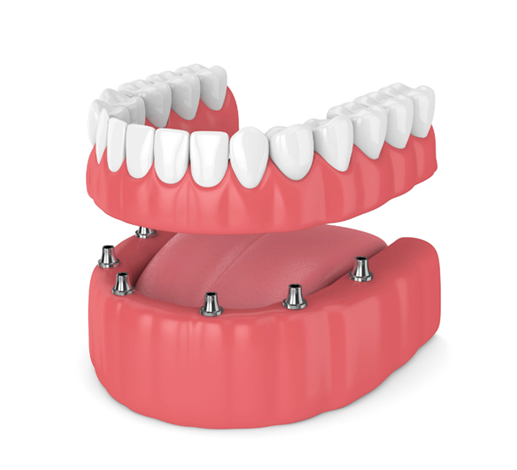
Single Tooth Implants
When only one tooth needs to be replaced, dental implants for one tooth are used. They resemble full mouth implants in appearance and functionality but are often smaller in size and less expensive.
To replace the missing tooth, an implant is first inserted into the jawbone. Next, a crown is attached to the implant.
An implant is first inserted into the jawbone, and then a crown is attached to the implant in two separate processes.
Implant implantation procedure may typically be completed in the office with local anaesthetic in about an hour. To access the jawbone below the tooth replacement site, a gum incision is created. In the jawbone, holes are made using a drill and filled with tiny screws (called osseointegrated implants). these screws act as the new tooth’s artificial roots, enabling a strong bond between it and the jawbone.
You will return to our office for implant placement surgery, also known as stage 2, after a period of time (the length of time depends on a variety of factors), during which we will fit the crown over your new implant fixture.
This particular dental implant is designed to replace three nearby teeth at once. When one tooth is absent from each quadrant of the mouth, it is frequently used to replace two missing front teeth (the upper left and upper right).
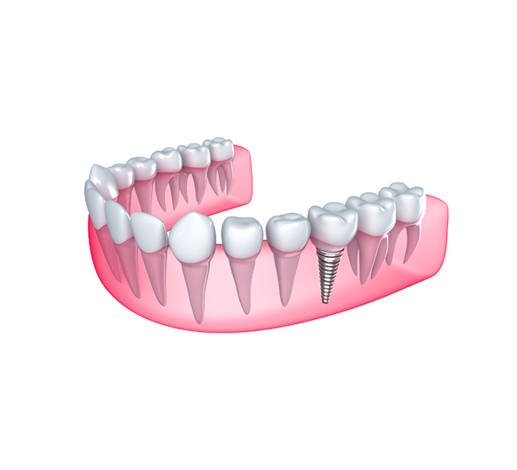
3 on 6 Dental Implants
Three neighboring teeth can be replaced with a single implant using 3 on 6 dental implants. Because it uses three attachment posts rather than one, this type of implant offers more stability between the replacement teeth and the native teeth than other implant types.
One post is placed into either side of the jawbone during this treatment, and it is connected to an abutment post that will support a crown or bridge prosthesis (the restoration).
The fact that patients have a wide range of crown options thanks to this technique makes it so well-liked among dentists. Despite the fact that there are various techniques for placing dental implants, such as the 2 on 4 or the 4 on 8, these only allow for the placement of crowns on one or two teeth. With 3 on 6, you have a number of alternatives when it comes to choosing an aesthetic appearance that matches your smile and personality because you can choose up to six distinct teeth for your crowns.
The fact that 3 on 6 makes implant placement easier and more effective than alternative techniques is another factor contributing to its popularity among dentists. For the insertion of each tooth implant in a 2 on 4 or 4 on 8 procedure, the surgeon must make several incisions into the jawbone. But with the 3 on 6, doctors just require one entry point into the jawbone and may insert all three implants through just one incision. Both the patient and the doctor benefit from this.
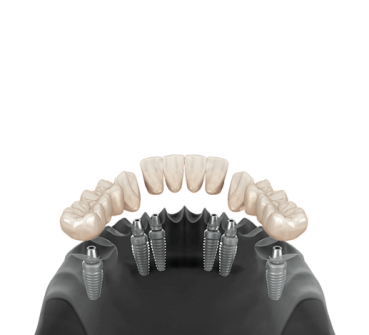
Mini Dental Implants
Mini dental implants are the best option for people with small jaws or mouths (such as children). Mini dental implants are the best option for patients whose jawbone is too thin for traditional implants. These implants offer a more realistic-looking smile when speaking or grinning because they are smaller than normal implants.
The most common kind of dental implant is made of titanium and inserted in the jawbone. To install the implant, which has a screw that will connect it to your natural tooth, a small hole must be drilled into the jawbone. This kind of implant can act as an anchor for a crown or bridge that mimics the appearance and feel of your natural teeth.
Mini dental implants are another option, and they are often utilized when there is not enough room in the mouth for regular implants. These implants are inserted without screws or attachments directly into the jawbone. They can act as anchors for bridges and crowns that mimic real teeth in appearance.
Implant dentistry is the best option for you if you want a high-quality, natural-looking replacement tooth. You may replace lost teeth without sacrificing your look thanks to the developments in dental implants and the cosmetic options offered to patients.
You should first consider the advice and viewpoints of your oral health professional regarding various implants. You must also choose between a conventional dental implant and an aesthetic dental implant depending on your medical history. The implications of each implant type should be discussed with your dentist, since their variations may have an impact on the length of the procedure and the type of post-operative care you may require.
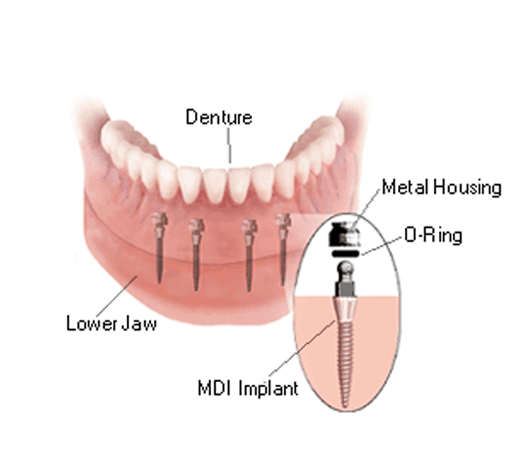
Should You Get a Denture or An Implant
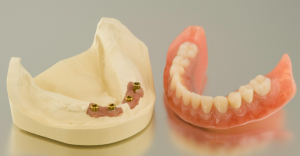
A lost tooth is rarely a humorous thing for most people. Losing teeth can affect more than just how you smile; it can also affect your general health and wellbeing. But replacing missing teeth doesn’t have to be a difficult process now that there are two effective options: dentures and dental implants. Find out which choice is best for you by reading on.
For those who are losing their teeth, dentures are becoming more and more common. Additionally popular are dental implants, but who should you pick? You might need to make a decision on this, so I want to make sure you are well-informed before you do.
Dental implants and dentures are two options for tooth replacement. Implants cannot be removed, although dentures may.
- Dentures
A prosthesis that replaces natural teeth are dentures. They can be taken off when not in use and are built specifically for each patient. Acrylic resin and porcelain, which mimic the appearance of real teeth but lack their strength and durability, are the materials used to make dentures. Dentures cannot support themselves over time like natural teeth can because they lack roots. The denture could become loose and move about in your mouth if it sustains any damage.
- Dental Implants
Dental implants are tiny, screw-like prosthetics that are inserted into the jawbone beneath the gum line. Since the implant serves as the tooth’s artificial root, you can eat without fearing that your denture will break. Best dental implants enhance speech articulation and lessen friction caused by food chewing on your denture surface area, which also helps you speak more confidently. Dental implants must be surgically implanted beneath the gum line, but once done, they are permanent.
- Durability
Many people are either unable to afford dentures or do not choose to obtain them. They choose dental implants as a substitute. While both solutions are viable and each has a unique set of advantages and disadvantages, there is one factor that distinguishes implants from dentures: durability.
Since dentures are typically created to order to fit your mouth properly and will be the same color as your other teeth, they might be a great alternative for replacing missing teeth. However, because they are not fixed into the jawbone like a dental implant would be, they are not as strong as dental implants. This implies that if you clench or grind your teeth (or if there is an accident), a denture could be entirely broken off or knocked out of position, leaving you with no teeth at all.
However, because dental implants are anchored into the jawbone, no matter what activity you engage in or how much pressure is placed on them while chewing or biting hard foods like steak or nuts, they won’t ever fall out of place (which happens quite often).
- Material
Dentures and dental implants are two options, but selecting one is not simple. Both have advantages, but they also have disadvantages.
Titanium is often used to make dental implants. Because titanium has a high strength to weight ratio, it can sustain forces without suffering damage. It is also capable of forming a strong link with human tissue, making it perfect for use in dental implants.
Acrylic or metal alloys like stainless steel or chromium cobalt are typically used to make dentures. These materials may not be as strong or effective at bonding with human tissue as titanium because they have different characteristics.
Where teeth once were, dental implants are titanium screws that are implanted into the jawbone. They support dentures, bridges, or crowns that are affixed to them. Best dental implants are resistant to decay and many oral disorders include gum disease (periodontal disease) and tooth decay, and they can survive for decades without any maintenance (caries).
- Appearance
Dentures and dental implants both replace lost teeth, which is their common function. While both are used to support fake teeth, they are different in terms of appearance and comfort. Dentures can be less comfortable than dental implants, which have a more realistic appearance.
When you select best dental implants, your smile won’t be affected because they are made to resemble your natural teeth. They cost more than dentures, though, and the recovery time is longer. Dentures provide more customization choices than dental implants and can be made to fit your mouth in a variety of shapes and sizes.
FAQ
Despite the fact that dental implants have become very popular recently, few individuals are really knowledgeable about them. People that utilize internet comparisons, such as price comparison sites, frequently become perplexed about the fundamental idea and how much the best dental implants cost.
This question doesn’t have a simple solution. Depending on where you live and the implant type you select, dental implants can cost anywhere from $2,000 to over $100,000. For instance, the cost may be higher if you reside in a region with few oral surgeons who conduct implants than if you do in a region with many qualified professionals. Price varies depending on the type of implant; small implants are more expensive than full-sized ones while single tooth implants are less expensive than numerous tooth implants. Additionally, some dentists will collaborate with insurance providers to lower expenses or offer special discounts on their services.
A full upper and lower denture is the most expensive option if you have eight or more lost teeth. This may run between $2,000 and $5,000 per jaw (the price varies by provider).
Dental implants are probably your best option if one to three teeth in either the upper or lower jaw are missing. Metal posts called implants are inserted into the jawbone and capped with a crown to mimic a natural tooth. The cost of an implant typically ranges from $6,500 to $15,000, depending on the dentist and region.
Depending on the style of bridge you choose and the location of its manufacture, dental bridges can cost anywhere from $2,000 and $7,500 per (in-office or lab-made).
Additionally, bear in mind that the cost of your treatment will be impacted if you have teeth issues other than merely missing ones (such as cracks or decay).
You might be able to get some or even the entire cost reimbursed by your plan if you have adequate dental insurance. If not, your dentist will inform you of the out-of-pocket expense. Ask about financing options if your insurance doesn’t cover dental implants or if it doesn’t provide enough coverage. Your dentist could also be able to assist you with this process by first providing you with a price and then figuring out how you can pay it back over time.
If you are missing teeth, you might be thinking about fixed dentures or implant-supported dentures. Both of these solutions can give you a brand-new, attractive grin. Each treatment, however, has advantages and disadvantages of its own.
People who want to avoid wearing full dentures should consider implant-supported dentures. Dental implants that can keep replacement teeth in place are supported by dental implants supported by the natural bone in your jaw. Although more expensive than permanent dentures, this type of therapy has numerous advantages that fixed dentures do not.
Fixed dentures are a cost-effective solution for tooth replacement. They are less expensive than implant-supported dentures, but to keep them in good condition over time, they need to be cleaned and relined on a regular basis.
Getting implant-supported dentures is a very easy process. Get a dental checkup first, and then have a dentist assess your teeth. This will enable the dentist to decide if you are a good candidate for detachable dentures that are supported by implants, or for implant-supported dentures. If your dentist determines that you are a good candidate, they will probably advise going to an oral surgeon to have the procedure done.
Titanium dental implants have a lifespan between 15 and 25 years. As they are constructed of metal, they do not deteriorate like natural teeth. The reason you may need to replace them is because the bone surrounding the implant will begin to resorb, or shrink away. This can occur for a variety of reasons, including the implant having been in place for too long and becoming totally fused with the jawbone, leaving no room for it.
They are constructed of titanium and can last a lifetime, but they require adequate maintenance.
Ensure that you are taking your vitamins as soon as possible. Vitamin B12 facilitates calcium absorption, which is essential for healthy bone formation. If you do not consume enough vitamin B12, the implant may not develop properly.
You should also floss at least once every day and brush your teeth frequently. This will prevent food particles from being lodged between your teeth and gums, which could result in infection or inflammation and cause implant damage over time.
Don’t panic if you find yourself in this predicament! You can get a new implant implanted next to the old one that will last the same amount of time.
The quick response is no. During the process, your dentist will make sure you are at ease and comfortable.
Dental implants are made to be positioned in the jawbone, where they will eventually meld with your body. However, your dentist first needs to remove a few of your natural teeth in order to make room for the implant. This procedure, while sometimes uncomfortable, is essential to ensuring the stability and longevity of your new implant.
Your dentist will select a suitable location for your implant and make it ready for implantation after the tooth has been removed. In order to place an implant, a hole must be drilled into your jawbone and an anchor must be inserted inside. On top of this anchor is then placed a post or screw, which will support your new tooth as it heals over time.
There are a number of different materials used in dental implants. The material used can affect the success of your implant, so it is important to understand which materials are best suited for your needs.
Porcelain-Filled Titanium (PFT): This is a popular option because it is strong and durable, but it can also be aesthetically pleasing as it looks similar to natural teeth. This can be a good choice for patients who have lost one or more teeth, but do not want to have a metal-looking smile.
Titanium: Titanium is another material that can be used in dental implants. These implants are less likely to cause allergic reactions than other types of metal, but they are more expensive and harder to place.
Cast gold: This is one of the most common types of materials for dental implants. It can be used with all types of patients, but it tends to be more expensive than other materials. Cast gold is also durable and does not need to be replaced like other types of implant materials do over time.
Stainless steel: This type of metal is often used in dentures because it is affordable and durable enough for daily use without breaking down over time like other materials might do after several years or if they’re exposed to too much wear-and-tear (such as chewing food). However, stainless steel isn’t always ideal for everyone due to its tendency toward corrosion when exposed to certain chemicals (such as hydrogen peroxide).
Cobalt-chromium: is typically used for crowns or bridges because it does not bond well with bone tissue; however, some dentists may use cobalt-chromium as an implant material if it is necessary for a patient’s particular case or situation (for example: if the surrounding jawbone is too fragile for titanium).
Zirconium: Is a highly resistant metal that is often used to create artificial joints. Zirconium implants tend to be expensive but are very effective at preventing bone loss around the implant site.
Ceramics: Ceramic dental implants are also very popular because they are durable, inexpensive, and easy to make to look like natural teeth. However, they can break easier than metals or polymers when hit against hard surfaces such as teeth or bone. They also tend to discolor over time due to exposure to ultraviolet light from the sun which can lead them to look yellow or brownish in color over time rather than white like natural teeth do when expose to UV light over long periods of time (such as during 30+ years’ worth of daily brushing).
Metals: Metals are the most common materials used in dental implants. In fact, many people have them already. They are strong, durable, and can be made to look like your natural teeth. However, they tend to cost more than other materials and may not last as long as other materials.
Biocompatible Polymers: Biocompatible polymers also known as resin-based composites are typically made from biocompatible materials such as titanium dioxide or zirconium dioxide that are mixed with organic substances like silicone rubber, acrylics, or polypropylene. These materials combine the strength of metal with the flexibility of an organic substance to provide a durable yet flexible material that can be molded into any shape necessary for dental implants.
Although zirconia implants have been available for a long, the general public is still relatively unaware of them. They can also be a wonderful option if you’re seeking for something more aesthetically pleasing than conventional ceramic or titanium implants. They’re a good choice if you’re looking for a more resilient alternative to conventional dental implants.
Zirconia is a remarkably robust and long-lasting substance, which makes them ideal for use in dental implants. They are also so light that your surrounding jawbone serves as their only support because of how lightweight they are. This means that when you chew food, they won’t irritate your cheeks or gums or do any further harm to your jaw.
Zirconia’s biggest flaw is that they aren’t flexible; they are far more difficult to bend than ceramic or titanium. It may be challenging to mold them into the proper shape for your mouth’s ideal functioning because of this, particularly if there are additional problems like bone loss or damaged gum tissue.
The term “gold tooth implant” is used frequently these days. It’s becoming a common alternative for people seeking dental care, so if you’re thinking about obtaining some new teeth, you should give it some thought.
But be sure you understand what it signifies before moving on and choosing to acquire one.
Small devices called gold dental implants are inserted into the jawbone at the location of the missing tooth. They have a prosthetic tooth root and are composed of porcelain or titanium. Once they are in place, they will permanently affix to your jawbone and become a part of your mouth.
As soon as you have enough bone to support the implant and it is not too close to any nerves or other teeth, you can have one. This could not be an option for you at all if you’ve lost all of your front teeth as a result of gum disease or decay because there won’t be enough bone left for the implant to properly fuse with. Most people seeking this kind of operation do so because they want their smile back but do not need anything permanent, such as dentures.
The simple answer is yes. While you can’t be certain that your specific case will be covered, most cases will be.
Dental implants are a type of tooth restoration that involves inserting a titanium screw into the jawbone, which then secures a prosthetic tooth. Dental implants are widely used to replace missing teeth or even entire jaws (known as “fixed partial dentures”). They can also aid in the stabilization of loose dentures and the improvement of chewing function. Dental implants are often considered medically necessary, which means they are covered by Medicare.
All dental services provided by qualified providers, including those working in hospitals or outpatient clinics, are covered by Medicare. Dental providers who accept Medicare patients have agreed to accept the same payment rates set by the federal government (as all doctors must), so patients will incur no additional costs beyond their standard Part B premium (which varies depending on income).
 Dentist Near Me
Dentist Near Me


